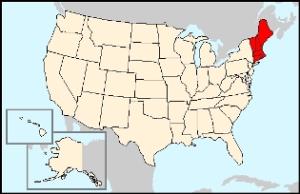No state east of the Mississippi has legalized marijuana, but the land of Yankees has several states that could free the weed this year.
It's busy, busy, busy in legislatures across the land.
A massive bust of corrupt prison guards in Georgia, drug prosecutions halted over sleazy police tactics in Waco, a San Antonio cop gets his hand slapped for stealing from citizens, and more.
A pair of state marijuana legalization bills get killed, a pair of state asset forfeiture reform bills advance; House Republicans want states to be able to drug test food stamp recipients, Senate Democrats want $600 million in anti-heroin funding, Mexico cartel mayhem continues, and more.
The California legalization initiative has enough money in the bank to easily pay for signature gathering, a Wyoming bill would make possession of three ounces of edibles a felony, Utah medical marijuana patients say they will go the initiative route after the Mormon Church says no a Senate bill, the New York Times looks at government complicity in Afghan opium production, and more.
Facebook is making life hard for marijuana businesses, marijuana and medical marijuana are on the agenda at statehouses across the land, a South Dakota welfare drug testing bill is back in "kinder, gentler" form, and more
This article was produced in collaboration with AlterNet and first appeared here.
No state east of the Mississippi has legalized marijuana, but that's very likely to change this year, and New England will be leading the way. Two of the six New England states will likely let the voters make the call in November, while the others all have legalization bills pending.

New England pastoral (wikimedia.org)
So far, with the exception of Washington, DC, where voters elected to legalize the possession and cultivation, but not the sale of marijuana in 2014, all of the legalization action has been in the West. The four states that have legalized it so far -- Alaska, Colorado, Oregon, and Washington -- are all Western states.
More Western states will likely legalize it this year, including the nation's most populous, California, as well as Arizona and Nevada. The Nevada Regulation and Taxation of Marijuana Act has already qualified for the November ballot, while the Arizona campaign behind that's state's Regulation and Taxation of Marijuana Act is well-advanced in signature gathering and appears poised to easily qualify for the ballot as well.
Meanwhile, California's Control, Regulate and Tax Adult Use of Marijuana Act (AUMA) is late out of the gate, but well-financed and broadly supported. It, too, should be on the ballot in November.
Another possible legalization state this year is Michigan, where the campaign behind the Michigan Marihuana Legalization, Regulation and Economic Stimulus Act just last week announced that it has 240,000 raw signatures and is aiming for 300,000 by March 15. But it needs 252,000 valid voter signatures to qualify, and with the rule of thumb for petition campaigns being that between 20% and 30% of raw signatures are likely to be invalidated, whether the Michigan initiative will qualify remains to be seen.
But it's Yankee country that will see the most concentrated regional push toward marijuana legalization this year. Initiatives that make the ballot will go before New England populations that are showing majority support for legalization this year, and, while progress toward legalization though the legislative process can be achingly difficult, the region also appears poised to produce the first state to free the weed through the legislature, not the popular vote.
Here's the rundown on New England legalization efforts this year. Chances are good that legalization will happen in two of them -- the initiative states -- and possibly in one or more of the other states:
Connecticut. Earlier this month, Rep. Juan Candelaria (D-New Haven) introduced House Bill 5209, which would allow adults to use, grow, and sell marijuana. Candelaria introduced a similar bill last year that went nowhere. "I'm going to be pushing very hard," Candelaria said. "I'm going to be engaging my leadership in conversation to at least allow a public hearing." Gov. Dannel Malloy (D) said the same day he could only support medical marijuana. "That's as far as I'm comfortable going," the governor said.
Maine. The legalization initiative from the Campaign to Regulate Marijuana Like Alcohol has not yet officially qualified for the ballot, but is poised to. On February 1, the campaign turned in more than 103,000 raw signatures from its petition drive. It only needs 61,000 valid voter signatures to qualify for the November ballot, and should have a sufficient cushion to do so. The most recent of Mainers' attitudes toward marijuana legalization, from the spring of 2015, had support at 65%.
Massachusetts. The legalization initiative from the Campaign to Regulate Marijuana Like Alcohol has already qualified for the ballot, but under Massachusetts law, the legislature must first take up the issue. If, as expected, it fails to adopt legalization, the campaign must then collect another 10,000 signatures to place the initiative on the November ballot. It should be able to do that easily, and if it gets on the ballot, it should win, although perhaps not as handily as Maine. There are no hot-off-the-press polls, but a 2014 poll had support at 53% and a Boston Globe poll from last year had a dead heat, with 48% in favor, 47% opposed. Numbers this tight means it's not a done deal, but given expected high voter turnout this election year, the Bay State should be able to pull it off.

Fall in New Hampshire (wikimedia.org)
The House actually passed a legalization bill in 2014, only to see it die in the Senate. This year, there are already three legalization bills filed, but two of them have already been deemed "
inexpedient to legislate" in committee. The remaining legalization bill,
House Bill 1610, is currently before the House Criminal Justice and Public Safety Committee. Even if the bill were to pass the House, it faces a tough battle in the Senate. In addition to killing legalization in 2014, the Senate has at least twice killed decriminalization bills that passed the House.
Rhode Island. Rep. Scott Slater (D-Providence) said he will file a marijuana legalization bill in the General Assembly last week, and Sen. Joshua Miller (D-Cranston) will file companion legislation in the Senate. As of Saturday, the bills have not yet been posted on the legislative website, but they are definitely coming. This marks the fifth consecutive year legalization bills have been filed in Providence, and they have previously been stifled, but there are signs progress could be made this year. The Senate bill has 17 cosponsors (out of 38 senators), and the House bill has more than 30 cosponsors. Republican House Leader Brian Newberry (R-North Smithfield) supports it, and House Speaker Nick Mattiello (D-Cranston), who has long opposed legalization, is now becoming "more open-minded" as eyes tax revenues from pot in the already legal states.
Vermont. The Green Mountain State is the most likely to actually pass a legalization bill this year. Senate Bill 241, backed by Gov. Peter Shumlin (D), has already passed the Senate Judiciary and Finance committees and is moving toward a Senate floor vote. But the committees have amended the bill to kill home cultivation and to reduce the legalized amount from an ounce to a half ounce. And if and when the bill gets out of the Senate, it still faces a tough battle in the House.
This could well be the year New England goes green. Winning in three states -- Maine, Massachusetts, and Vermont -- would be a big victory; winning in more would be a very pleasant surprise. Not winning in any of them would be a huge setback for the marijuana reform movement, but at this point, that looks extremely unlikely.
back to top
It's busy, busy, busy in legislatures across the land.
ArizonaOn Tuesday,
state GOP lawmaker seeks to bar use of welfare EBT cards in dispensaries. Rep. Kate Brophy (R-Phoenix) has filed a bill, House Bill 2261, that would add dispensaries to the list of locations where EBT cards that deliver cash cannot be used. Other banned locations include liquor stores, race tracks, casinos, and strip clubs. The bill got a hearing in the House Rules Committee, but was criticized by Rep. Randall Friese (D-Tucson), a physician. "I have a little trouble just saying you can get your prescription medications but not your medical marijuana," said Friese. "Medical marijuana is used for a variety of things that help people with chronic pain, glaucoma, anorexia, intractable nausea."Hawaii
On Monday, state lawmakers were pondering a bill to allow outdoor and greenhouse grows. Under the state's medical marijuana law, the Department of Health has decided that all cultivation must take place in an enclosed structure, but lawmakers say that wasn't their intent, and they are preparing a bill that would clarify that medical marijuana could be grown in the open air, in greenhouses, or in shade houses.
Massachusetts
Last Friday, the stae doubled the amount of medical marijuana patients can purchase. The Department of Public Health last Friday more than doubled the amount of medicine patients can possess after regulators said laboratories can ensure the safety of the drug. Now, patients will be able to buy up to 10 ounces of medical marijuana every two months.
Missouri
On Monday, a medical marijuana bill got a House committee hearing. The House Emerging Issues Committee heard testimony Monday night on the Compassionate Care Act (House Bill 2213), which would allow up to 30 dispensaries and 30 cultivation operations statewide. The committee took no action and no further hearings are currently scheduled.
Oregon
On Tuesday, a bill to let pot shops sell tax-fee medical marijuana advanced. A joint legislative committee approved the bill that would allow recreational marijuana businesses to produce, process, and sell medical marijuana products. Senate Bill 1511 now heads for a Senate floor vote.
Utah
On Tuesday, frustrated patients said they would resort to a ballot initiative to get medical marijuana. Last week, the LDS Church came out against Senate Bill 73, a full-fledged medical marijuana bill, severely damaging its prospects in the legislature. That has prompted patient advocates to announce today that they plan to pursue a medical marijuana initiative. They will face a ticking clock: They have less than 60 days to gather 101,744 valid voter signatures to qualify for the November ballot.
On Wednesday,a new poll found nearly two-thirds support medical marijuana. Some 64% of Utahns support medical marijuana, up from 61% just two months ago, according to a new Utah Policy poll. The poll comes as progress on a full-blown medical marijuana bill in the legislature appears blocked and as patient activists say they are about to embark on an initiative campaign to get around legislative inaction.
Virginia
On Monday, a CBD cannabis oil bill advanced. In a last-minute reprieve, the Senate Courts of Justice Committee Monday night approved a bill that would allow state residents to more easily obtain CBD cannabis oils to treat epilepsy. The state last year approved a CBD cannabis oil bill, but it has no provisions for legally obtaining the medicine. The bill still awaits floor votes in both the House and the Senate.
[For extensive information about the medical marijuana debate, presented in a neutral format, visit MedicalMarijuana.ProCon.org.]
back to top
A massive bust of corrupt prison guards in Georgia, drug prosecutions halted over sleazy police tactics in Waco, a San Antonio cop gets his hand slapped for stealing from citizens, and more. Let's get to it:
In Waco, Texas, drug prosecutions were put on hold last Thursday after a narcotics detective was accused of putting false information in a police report. Waco Police Detective David Starr allegedly made false claims in a report and an affidavit from Starr regarding a February 2015 drug case. The report claimed the bust resulted from "interdiction" operations conducted by the Waco Police, but Starr later admitted the bust arose from a confidential informant and that he was ordered to misleadingly word the reports. Now, the Texas Rangers are investigating and hundreds of drug cases are at risk. "Unfortunately, as a further result of this unacceptable conduct, I will be forced to dismiss certain cases while an investigation into this matter is conducted," the McLennan County prosecutor said.In Atlanta, 46 current and former prison guards and staff were arrested by the FBI last Thursday as the result of a two-year undercover operation targeting "staggering corruption within Georgia Department of Corrections institutions," as federal prosecutors put it. Among those arrested were five members of an elite squad charged with targeting drug dealing in the prisons. The guards and staff are accused of smuggling liquor, drugs, cell phones and other contraband into the prisons, as well as facilitating drug deals involving multiple kilos of cocaine and meth on both sides of the prison walls.
In Boston, a Bridgewater state prison guard was arrested Tuesday after state police set up an undercover heroin deal. Stephen Lebreux, 40, sold heroin to undercover officers on multiple occasions while off-duty and not at the prison. He is charged with heroin trafficking.
In San Antonio, a San Antonio police officer was sentenced last Thursday to three years' probation for stealing marijuana, a rifle, and thousands in cash from a local couple. Officer Konrad Chatys had responded to a domestic dispute between the couple when he took the items. As he did so, he told them he was "letting them get away with too much already." Chatys must also pay restitution to the couple.
back to top
A pair of state marijuana legalization bills get defeated, a pair of state asset forfeiture reform bills advance; House Republicans want states to be able to drug test food stamp recipients, Senate Democrats want $600 million in anti-heroin funding, Mexico cartel mayhem continues, and more.

Senate Democrats want $600 million to fight the heroin and pain pill epidemic. (Chicago PD)
New Hampshire House Kills Legalization Bill. The House voted last Thursday to kill House Bill 1694, which would have legalized the use of marijuana by adults. The House has previously passed legalization, only to see if die in the Senate. Another legalization bill, House Bill 1610, is currently before the House Criminal Justice and Public Safety Committee.
New Mexico Senate Kills Legalization Initiative Bill. The state Senate last Friday voted 24-17 to kill SJR 5, which would have placed a constitutional amendment to legalize marijuana on the November ballot. Six Senate Democrats voted "no" along with all the Republican members.
North Dakota Legalization Initiative Needs Redo. State Attorney General Wayne Stenehjem (R) said last Thursday that a legalization petition submitted the day before was flawed because it used a list of Schedule I substances that was not current. Eric Olson, who heads the sponsoring committee for the initiative, said the committee will resubmit the petition. The group has until July 11 to come up with some 13,000 valid voter signatures.
Medical Marijuana
Hawaii Lawmakers Ponder Bill That Would Allow Outdoor, Greenhouse Grows. Under the state's medical marijuana law, the Department of Health has decided that all cultivation must take place in an enclosed structure, but lawmakers say that wasn't their intent, and they are preparing a bill that would clarify that medical marijuana could be grown in the open air, in greenhouses, or in shade houses.
Massachusetts Doubles Amount of Medical Marijuana Patients Can Purchase. The Department of Public Health last Friday more than doubled the amount of medicine patients can possess after regulators said laboratories can ensure the safety of the drug. Now, patients will be able to buy up to 10 ounces of medical marijuana every two months.
Asset Forfeiture
Florida Asset Forfeiture Reform Bill Advances. A bill that would end civil forfeiture was approved by the Senate Appropriations Subcommittee on Criminal Justice last Thursday. The measure is Senate Bill 1044, sponsored by Sen. Jeff Brandes (R-St. Petersburg).
Wyoming Asset Forfeiture Reform Bill Advances. A bill that would end civil forfeiture was approved by the House Judiciary Committee last Thursday. The measure is House Bill 14. It is nearly identical to a bill that easily passed the legislature last year, only to be vetoed by Gov. Matt Meade (R). It looks like another veto showdown could be coming.
Drug Policy
London School of Economics Issues "After the Drug Wars" Report. A new report from the London School of Economics, After the Drug Wars, calls for the war on drugs to be replaced by sustainable development goals (SDGs). The report is endorsed by Colombian President Juan Manuel Santos and five Nobel Prize recipients. "The question now is not, whether to end the 'war on drugs', but what to replace its failed policies with," said Dr John Collins, coordinator of LSE IDEAS International Drug Policy Project and editor of the report. "The path to drug peace becomes clearer if we look to the SDGs as the way to address the root causes of many socioeconomic problems, one of which is problematic drug use. It is also the way to tackle the systemic causes of illicit market violence, which is often a product of and worsened by hard-line prohibitionist policies. The global priorities should be -- develop first, manage drug issues second. If states pursue prohibitionist policies in the absence of development and political integration, the result is usually instability, violence and failures on drug control goals. To be successful states must recognise that policies need to be properly sequenced. Focusing on the SDGs over counterproductive drug control goals is the way to do this."
Democrats Seek $600 Million for Emergency Heroin Bill. Just after the Senate Judiciary Committee approved the Comprehensive Addiction and Recovery Act (Senate Bill 524), Senate Democrats announced they will try to add a $600 million funding measure authored by Sen. Jeanne Shaheen (D-NH) to the bill. The measure includes funding for treatment, prevention, and recovery at the state level, as well as funding for treatment and law enforcement programs. Senate Majority Leader Mitch McConnell (R-KY) is expected to bring the Recovery Act to the Senate floor shortly.
Drug Testing
House Republicans Pushing Measure to Allow States to Drug Test Food Stamp Recipients. Rep. Robert Aderholt (R-AL), chair of the House Agricultural Appropriations Subcommittee, last Thursday unveiled a measure that would allow states the option of drug testing people who apply for the federal Supplemental Nutrition Assistance Program (SNAP) program. The Agriculture Department, which administers the program, currently says states cannot impose new requirements, such as drug testing, under the program.
Harm Reduction
Alaska Naloxone Bill One Vote Away From Passage. A bill to increase access to opioid overdose reversal drugs passed its final House committee vote last Friday and now heads for a House floor vote. The measure, Senate Bill 23, has already passed the Senate. It grants immunity for those prescribing or administering naloxone (Narcan) and allows pharmacies to legally dispense the drugs to members of the public without a prescription.
Law Enforcement
Maine Bill to Stiffen Penalties for Out of State Drug Dealers Advances. The Criminal Justice and Public Safety Committee voted mainly along party lines last Wednesday to approve LD 1541, which would increase the sentences for out of state drug dealers. The measure advanced despite criticism that it would be difficult to prove drug importation in court and that the state already sufficiently punishes drug dealers. It is being championed by Gov. Paul Le Page, who was called for the use of the guillotine to execute drug dealers, called for vigilantes to shoot drug dealers, and accused black drug dealers from New Year of impregnating white Maine girls.
International
Four Swiss Cities to Create Cannabis Club Pilot Projects. Basel, Bern, Geneva, and Zurich have agreed to launch a pilot project for cannabis clubs where consumers could use the drug. The projects are to be run over four years and will be scientifically evaluated. But they must first be approved by canton governments and the federal office of public health.
Mexican Cartel Prison Battle Leaves 49 Dead. A battle last Wednesday between Zetas cartel members and rivals from other drug gangs left 49 people dead at the Topo Chico prison near Monterrey. One inmate was killed by gunfire; the rest by being stabbed with bottles or blades or by being hit with objects. The prison has long housed Zetas, who dominate much of its interior.
Upstart Mexican Cartel Makes a Move on Tijuana. After five years of relative peace in the border town, killings are on the increase, with many of the victims described as low-level members of the city's drug trade. The uptick in violence is being blamed on the Jalisco New Generation cartel, which has been leaving messages with mutilated corpses on city streets or hanging from bridges. People were being killed at a rate of more than two a day in January, making it the most violent January since 2010. Jalisco New Generation is believed to be challenging the Sinaloa cartel, which currently dominates the Tijuana drug trade.
back to top
The California legalization initiative has enough money in the bank to easily pay for signature gathering, a Wyoming bill would make possession of three ounces of edibles a felony, Utah medical marijuana patients say they will go the initiative route after the Mormon Church says no to a Senate bill, the New York Times looks at government complicity in Afghan opium production, and more.

In Afghanistan fields the poppies grow, and it's not like the government doesn't know. (unodc.org)
California Legalization Initiative Has $2.25 Million in the Bank. The Adult Use of Marijuana Act (AUMA) is financially well-prepared to get the several hundred thousand voter signatures needed to qualify for the November ballot. With a new $500,000 donation from tech entrepreneur Sean Parker, who earlier kicked in another $500,000, the campaign is sitting on $2.25 million. Other major contributors include Weed Maps ($500,000), the Drug Policy Alliance's political action arm ($500,000), and a PAC funded by the heirs of Progressive Insurance magnate Peter Lewis ($250,000). That's enough money to pay for signature gathering and then some.
After South Dakota Vote to Kill Internal Pot Possession Law Fails, Tribe Again Moves Forward With Marijuana Facility Plan. After the House Health and Human Services Committee voted 11-1 Tuesday to kill a bill to end the state's unique law making "internal possession" of marijuana a crime, the Flandreau Santee Sioux Tribe announced it will work with federal officials in an effort to get its marijuana production facility back on track. The tribe last year began production and planned a New Year's Eve bash with legal marijuana, but destroyed its crop in November in the face of uncertainty about the federal response and a hostile response from state officials, who warned that anyone coming off the reservation who had used marijuana could be charged with internal possession.
Wyoming Senate Panel Advances Bill That Makes Possession of Three Ounces of Edibles a Felony. The Senate Judiciary Committee Monday approved Senate File 96, which closes a legal loophole around the legality of edible marijuana products. At least two state judges had ruled that the state law was unclear on edibles. The bill originally made possession of more than a pound of edibles a felony, but under urging from state officials, lawmakers approved an amendment lowering the amount that triggers felony charges to three ounces. The panel ignored complaints from Sen. Michael Von Flatern (R-Gillette) that it was criminalizing the weight of edibles rather than THC content.
Medical Marijuana
Missouri Medical Marijuana Bill Gets House Committee Hearing. The House Emerging Issues Committee heard testimony Monday night on the Compassionate Care Act (House Bill 2213), which would allow up to 30 dispensaries and 30 cultivation operations statewide. The committee took no action and no further hearings are currently scheduled.
Utah Patients Resort to Ballot Initiative After Mormon Church Warns Legislature on Medical Marijuana. Last week, the LDS Church came out against Senate Bill 73, a full-fledged medical marijuana bill, severely damaging its prospects in the legislature. That has prompted patient advocates to announce today that they plan to pursue a medical marijuana initiative. They will face a ticking clock: They have less than 60 days to gather 101,744 valid voter signatures to qualify for the November ballot.
Virginia CBD Cannabis Oil Bill Advances. In a last-minute reprieve, the Senate Courts of Justice Committee Monday night approved a bill that would allow state residents to more easily obtain CBD cannabis oils to treat epilepsy. The state last year approved a CBD cannabis oil bill, but it has no provisions for legally obtaining the medicine. The bill still awaits floor votes in both the House and the Senate.
International
Afghan Government Profiting Off Poppy Trade. The US has spent more than $7 billion trying to wipe out the Afghan opium poppy industry, but the government the US supports in Kabul is deeply involved in the trade, the New York Times reports: "More than ever, Afghan government officials have become directly involved in the opium trade, expanding their competition with the Taliban beyond politics and into a struggle for control of the drug traffic and revenue. At the local level, the fight itself can often look like a turf war between drug gangs, even as American troops are being pulled back into the battle on the government's behalf, particularly in Helmand, in southern Afghanistan." The Times also quotes researcher David Mansield: "There are phases of government complicity, starting with accommodation of the farmers and then on to cooperation with them," said David Mansfield, a researcher who conducted more than 15 years of fieldwork on Afghan opium. "The last is predation, where the government essentially takes over the business entirely."
back to top
Facebook is making life hard for marijuana businesses, marijuana and medical marijuana are on the agenda at statehouses across the land, a South Dakota welfare drug testing bill is back in "kinder, gentler" form, and more.
Marijuana PolicyFacebook Shutting Down Marijuana Business Pages. The social media application has recently deleted or suspended dozens of accounts operated by marijuana businesses, without even a warning about possibly offensive material. It's not just businesses that actually deal in marijuana; Facebook has been typically unresponsive, saying only that "These pages have been removed for violating our community standards, which outline what is and is not allowed on Facebook."
Maryland Lawmakers Reject Effort to Increase Penalties for Public Marijuana Smoking. The House of Delegates Wednesday turned back GOP efforts to make it a misdemeanor offense to smoke pot on the Ocean City boardwalk, in state parks, or other public spaces. The move was a proposed amendment to a bill that would make it a misdemeanor to smoke pot in a vehicle. The bill treats in-car pot smoking like an open container violation, with fines, but no jail time.
Oregon House Approves Marijuana Banking Bill. The House has passed House Bill 4094, which protects banks and credit unions from any state liability for dealing with state-legal marijuana businesses. The bill passed on a 56-3 vote and now heads to the Senate.
Medical Marijuana
Arizona GOP Lawmakers Seek to Bar Use of Welfare EBT Cards in Dispensaries. Rep. Kate Brophy (R-Phoenix) has filed a bill, House Bill 2261, that would add dispensaries to the list of locations where EBT cards that deliver cash cannot be used. Other banned locations include liquor stores, race tracks, casinos, and strip clubs. The bill got a hearing Tuesday in the House Rules Committee, but was criticized by Rep. Randall Friese (D-Tucson), a physician. "I have a little trouble just saying you can get your prescription medications but not your medical marijuana," said Friese. "Medical marijuana is used for a variety of things that help people with chronic pain, glaucoma, anorexia, intractable nausea."
Oregon Bill to Let Pot Shops Sell Tax-Free Medical Marijuana Advances. A joint legislative committee Tuesday approved the bill that would allow recreational marijuana businesses to produce, process, and sell medical marijuana products. Senate Bill 1511 now heads for a Senate floor vote.
Utah Poll Finds Nearly Two-Thirds Want Medical Marijuana. Some 64% of Utahns support medical marijuana, up from 61% just two months ago, according to a new Utah Policy poll. The poll comes as progress on a full-blown medical marijuana bill in the legislature appears blocked and as patient activists say they are about to embark on an initiative campaign to get around legislative inaction.
Asset Forfeiture
Wyoming Senate Approves Asset Forfeiture Reform Bill. The Senate Wednesday approved Senate File 46, which would require a judge to find probable cause property was used or intended to be used in drug trafficking before it could be seized. The bill does not end civil asset forfeiture, but does raise the bar for the state. A measure pending in the House would end civil asset forfeiture, but faces a veto from Gov. Matt Mead (R), who vetoed similar legislation last year. The Senate bill now goes to the House.
Drug Testing
South Dakota Welfare Drug Testing Bill Returns in "Kinder, Gentler" Form. After an earlier bill that would have required drug testing for all welfare recipients was killed, Sen. Phil Jensen (R-Rapid City) has introduced Senate Bill 153, which would randomly drug test 2% of welfare applicants. The bill was set for a hearing in the Senate Health and Human Services Committee today.
back to top







